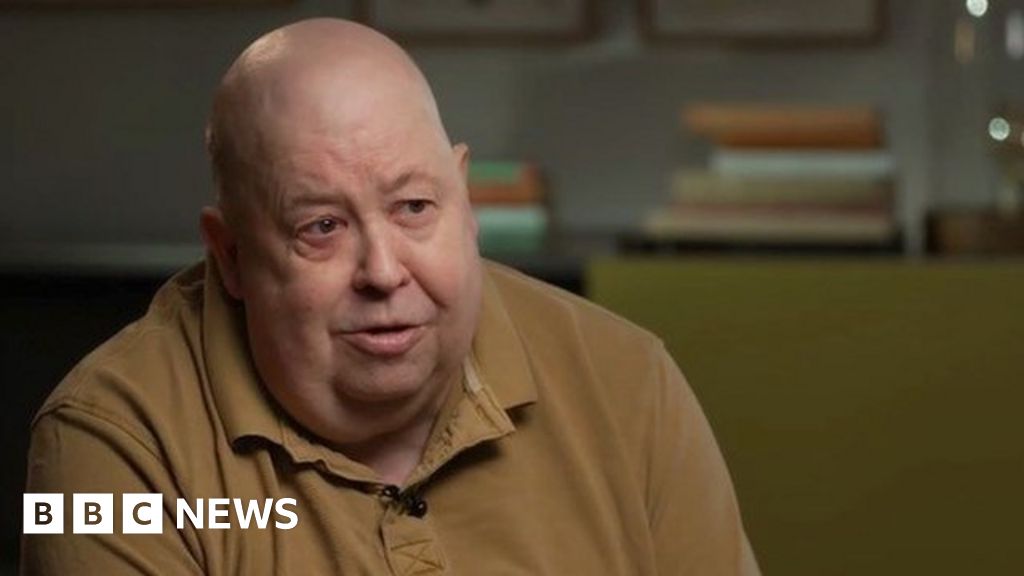- By Joe Pike and Charlotte Rowles
- BBC Newsnight
A man discovered a medical specimen bag had been left inside his stomach after his hernia surgery, the BBC has found.
The surgeon who carried out the procedure, at the Royal Sussex County Hospital in Brighton in 2016, also left behind part of Tom Hadrys’s bowel that had been cut out during the operation.
According to a hospital incident report seen by BBC Newsnight, the surgeon realised his mistakes while driving home from work.
Sussex Police are investigating at least 105 cases of alleged medical negligence by two surgery teams at the University Hospitals Sussex NHS Foundation Trust.
The trust said the work of its surgery teams “are continuously and closely monitored”, and “whenever our care falls short of our high standards, we take immediate action”.
Coming round in a recovery ward bed as the effects of his general anaesthetic were wearing off, retired engineer Tom Hadrys, 63, remembers being approached by a doctor.
“I was conscious,” Mr Hadrys says, “and I heard what must have been the surgeon whispering in my ear. He said, ‘I’m terribly sorry’, and I think he said, ‘We made a mistake, and I’ve got to take you back to surgery’.”
Mr Hadrys later learned the surgeon had been running through the operation in his mind while driving home and realised what he had done.
“He turned his car around and drove back to the hospital,” Mr Hadrys says.
The same surgeon subsequently performed a second surgical procedure to remove both the specimen bag and the section of bowel mistakenly left behind during the initial operation.
Classed by hospital managers as a “never event” – something that should not have happened – it led to a serious incident investigation.
The hospital trust conceded the surgical errors inflicted on Mr Hadrys meant his recovery was prolonged. In 2020, it apologised and awarded him a settlement of £15,000.
But the surgeon – who the BBC is not naming for legal reasons – continued to operate and still works at the trust. He was subsequently appointed to a consultants’ rota against the advice of some colleagues who did not think he was sufficiently qualified.
Further “concerns about the competence” of the surgeon were highlighted in emails between senior staff. And in 2019, the General Medical Council (GMC), which regulates doctors in the UK, contacted the hospital trust in response to a complaint it had received relating to the same surgeon.
The trust says the GMC inquiry was not related to patient safety and that it concluded there was “no case to answer, and no action required”.
In 2022, the Care Quality Commission (CQC) – the independent healthcare regulator – contacted the hospital trust with concerns about operations carried out by the same surgeon. “Details supplied by the trust assured us that no further action was required from CQC on that occasion,” the CQC told the BBC.
Junior doctors at the hospital had also raised a number of general patient safety concerns – including about this surgeon – with the chief executive and chief medical officer.
The trainees’ wider concerns – including about an “apparent increase in death rates over a period of years” – were cited in an independent report from Health Education England.
Professor Katie Urch, Chief Medical Officer at University Hospitals Sussex NHS Foundation Trust, said: “Our surgery staff are committed to delivering the best, safest care to our patients, often in challenging situations.
“Surgeons do not work as individuals, they work collaboratively in teams. Those teams are highly skilled, performing complex surgery that is never without some risk.
“Their outcomes are continuously and closely monitored – both internally and externally – and whenever our care falls short of our high standards, we take immediate action to learn and improve.”
The BBC has been investigating patient safety concerns at University Hospitals Sussex NHS Foundation Trust for ten months.
In 2023, four whistleblowers told the BBC patients had died unnecessarily while others were “effectively maimed”. The whistleblowers also complained of a “mafia-like” management culture.
The trust previously said its main priority was delivering “safe and effective care”, that data does not reflect allegations of unnecessary deaths, and that there was no evidence of a top-down toxic culture.
Some eight years on from his own hernia operation, Mr Hadrys told Newsnight of the lasting negative impact on his health.
“There’s no doubt whatsoever that I’m suffering,” he says. “It’s affected me. I have a weak abdomen now, I can’t really lift anything heavy.”

Rachel Carter is a health and wellness expert dedicated to helping readers lead healthier lives. With a background in nutrition, she offers evidence-based advice on fitness, nutrition, and mental well-being.







